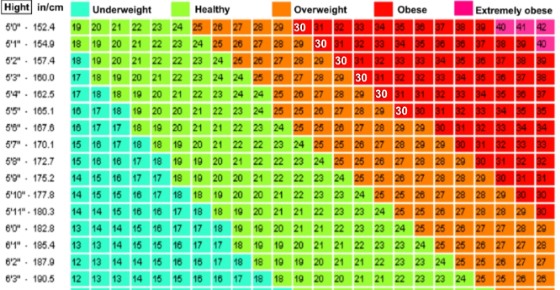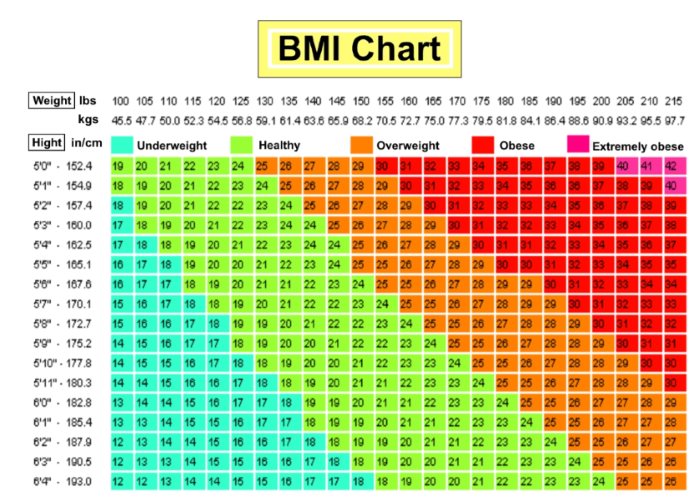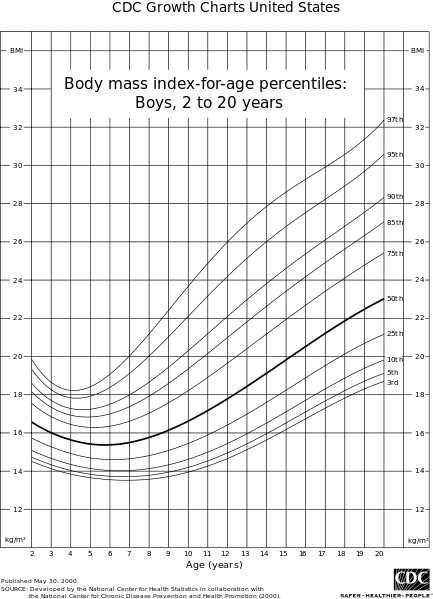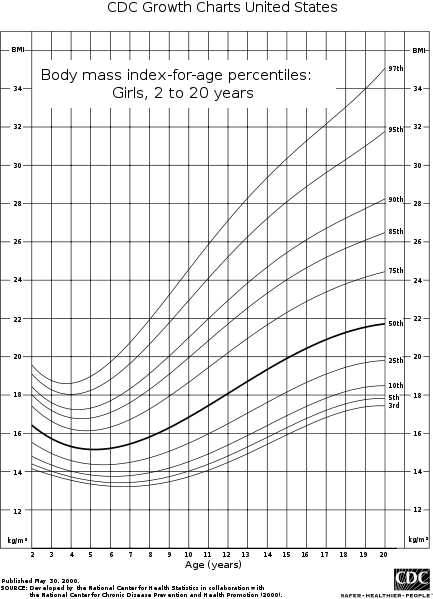BMI Calculator Chart: What is Can and Cannot Tell You

A BMI calculator chart (body mass index chart) can help to determine if you are overweight, obese, or having a healthy weight. Knowing if you have too much body fat can motivate you to make positive lifestyle changes to lose weight and improve your health. Being obese or overweight can cause a number of health problems including cardiovascular disease, diabetes, increased risk of chronic pain, and even cancer.
What is BMI?
BMI stands for “body mass index” – this is a number calculated using your height and weight to determine where your body mass stands. If the number is above a certain value, you are overweight or obese. If the BMI is below a certain value, you are underweight. There is also a “golden area” in between those values where a BMI indicates a healthy weight.
What is the BMI Chart?
The easiest way to find your BMI is to use the BMI chart which is sometimes referred to as an obesity chart or overweight chart.
The BMI chart can help you to instantly find your body mass index based on your height and weight. This number can help you determine if your weight is normal, or if you are overweight or obese.
Dr. Michael Dansinger, who is an authority on diet and lifestyle, explains that 2 people could weigh the same but have different BMI readings. For example, the taller person could have a normal BMI whereas the shorter person could be overweight or even obese.1
- The ideal BMI reading for a healthy weight is 18.5 to 24.
- Being overweight means that you have a BMI score of between 25 and 29.9.
- A score of 30 and above means that you are obese.
In this article, you will find out how to work out if you are overweight or obese using the BMI chart. You will also learn about health risks associated with obesity and what you can do about it.
How Can I Tell If I’m Overweight or Obese?
Obesity or being overweight is determined by how much extra body fat you are carrying in relation to your height. One way to tell if you are overweight or obese is to measure your waist. Dr. Michael Dansinger says that women shouldn’t have a waist size of more than 35 inches (89 cm) and men no more than 40 inches (101 cm).1
Most doctors tell if your weight is classed as underweight, normal, overweight, or obese using the BMI calculator chart. However, when determining if the BMI chart classes you as overweight or obese, doctors also take into account factors like:
- Where your fat has accumulated or is it mainly muscle mass
- Levels of your physical activity
- Differences between ethnic groups
Depending on the stage of obesity, you may have an increased risk of high blood pressure, osteoarthritis, type 2 diabetes, sleep apnea, or even a heart attack.
Obesity Chart vs. BMI Chart
Some people refer to the body mass index (BMI) chart as the overweight chart or obesity chart. However, they are all one and the same thing. The BMI chart is used by people and medical professionals to see if a person is overweight or obese.2
How to Calculate My BMI?
How can you calculate your BMI to determine if you need to lose weight and how much weight you should lose?
The easiest way to check if your BMI is within the normal range is to check your height and weight on the BMI calculation chart. But you can also calculate your body mass index without the chart using the BMI formula. Doctors from the National Health Service give the exact formula to calculate body mass index. This is as follows:3
How to calculate the BMI using metric measurements (for men and women):
- Multiply your height in meters by itself and record the result.
- Divide your weight in kilograms (kg) by the result from the first step.
- The result is your body mass index.
For example, here is how to calculate the BMI of a person who is 1.7m (67 inches) tall who weighs 75kg (165lbs):
- 1.7 x 1.7 = 2.89
- 75 / 2.89 = 25.9
This BMI indicates that the person is slightly overweight.
How to calculate the BMI using imperial (US) measurements (for men and women):
- Multiply your height in inches by itself and record the result.
- Divide your weight in pounds (lbs.) by the result from the first step.
- Multiply the result by 703 to get your BMI.
For example, here is how to calculate the BMI of the same person using imperial measurement calculations:
- 67 x 67 = 4,489
- 165 / 4,489 = 0.036
- 0.036 x 703 = 25.8
Here are the formulas to calculate BMI for metric and imperial measurements:
How to Use the BMI Chart to Find if You are Overweight or Obese
Looking at a BMI chart (obesity/overweight chart) can help you to easily know if you need to lose weight quickly.
What number is considered obese or overweight from your BMI readings? According to the journal Nutrition Today, the following is the standard way to interpret BMI readings:4
- Underweight – below 18.5
- Healthy weight – between 18.5 and 24.9
- Overweight – between 25 and 29.9
- Class I obesity – between 30 and 34.9
- Class II obesity – between 35 and 39.9
- Class III obesity (morbid obesity) – 40 and above
Look at the BMI chart below and find your height in the first column. Then, find your current weight from the numbers along the top and find the corresponding number on the chart. The chart is color-coded as an indicator of your BMI.
- Green means your BMI is normal or healthy
- Amber is a warning that your BMI has tipped over into the overweight category
- Red shows that you are in the obese category and must think about losing weight
Is the BMI Chart Suitable for All Adults?
The BMI chart is suitable for most people aged 18 and over. But, it may not be suitable if you have a very muscular build. This is because having lots of muscle may put you in the overweight or obese categories, even if you have little body fat.
For example, professional rugby players can fall into the “obese” category despite having very little body fat. However, this will not apply to most people. In addition to BMI, your waist circumference can provide information about your health. You can learn more about it in my article about why body shape matters.
What the BMI Chart can Tell you
Of course, the BMI chart doesn’t tell you everything about your health, but it can be one of the indicators of where your general health is at.
For example, if your BMI shows that you are too thin or have a low BMI, this may indicate that you have some nutritional deficiencies or other health issues.
At the other end of the spectrum, if your BMI shows that you are very overweight or in the obese category, you may be at risk of serious health problems. Doctors from the Centers for Disease Control and Prevention (CDC) say that there is a correlation between BMI and excess body fat.5
When determining if a person who is overweight has an increased risk of various health issues, healthcare providers usually take more factors into consideration. It is generally agreed that obesity puts a person at greater risk of developing any of the following health problems:5
- Increased risk of mortality
- High blood pressure, coronary heart disease, and stroke
- Type 2 diabetes
- Elevated levels of “bad” (LDL) cholesterol
- Chronic inflammation and joint pain
- Sleeping problems
- Increased risk of developing certain cancers
What the Obesity Chart can’t Tell You
The obesity chart isn’t a definitive indicator of your health. The journal Nutrition Today outlined some of the limitations when interpretation health risks of obesity or being overweight using only BMI readings.
For example, the BMI calculations don’t account for the difference between muscle mass and excess body fat.
In addition, the BMI calculation doesn’t account for the location of the excess fat, and cannot tell whether you have visceral fat, which can increase your risk of getting a heart attack. For example, when it comes to body fat, most doctors agree that body fat accumulated around the waist poses a greater health risk than fat that is evenly distributed throughout the body. Some people gain weight in their abdominal regions (the so-called ”apple” body shape). Others are ”pear-shaped,” with excess weight around the hips and buttocks. People with apple shapes are at higher risk for health problems associated with being overweight.
Also, people from different ethnic groups generally have different levels of fat naturally occurring, which may or may not indicate health risk.4
Additionally, someone who was formerly obese but lost a lot of weight quickly, may now have a BMI in the healthy range, but could still be at risk of developing obesity-related illnesses due to a lifetime of being overweight.
To find out more information on the risk that excess fat causes in your body, please read my article on how to calculate your body fat percentage. This takes into consideration your sex, age, and distribution of body fat.
How to Calculate the BMI of Children
With the increase in childhood obesity and weight problems, many parents want to know how to calculate BMI of their children.
According to the Centers for Disease Control and Prevention (CDC), a child’s BMI is calculated differently from adult BMI. As with adults, BMI in children can be an indicator if they are at risk from diseases like heart disease, diabetes, and other weight-related health issues.6
However, additional factors are taken into consideration to work out the BMI of children. These are:
- Age of the child
- Sex of the child
To calculate your child’s BMI, you should, first of all, use the same BMI calculation chart for adults. Then, you use a BMI-for-age percentile chart to get an indicator if your child’s weight is healthy in relation to their age and sex.
BMI overweight chart for children
Once you have calculated the BMI of your child as you would for an adult, you can use the chart below to see the body mass index-for-age percentile.
Doctors from the CDC say that you can find out the weight status category of your child using the table below:6
- Underweight – less than the 5th percentile.
- Healthy weight – between the 5th percentile and 85th percentile.
- Overweight – between the 85th percentile and 95th percentile.
- Obese – Over the 95th percentile.
Health Issues Caused by Obesity
Although there is some discussion on the importance of checking your height and weight against the BMI chart, doctors agree that obesity is bad for your health. A BMI reading of over 30 can mean that excess weight is taking a toll on your health and sooner or later you may develop serious health problems.
For example, doctors from Harvard Medical School say that obesity affects almost every area of your life. Carrying around extra pounds impacts your reproductive system, metabolism, causes hormonal imbalance, and an increased risk of developing debilitating diseases. However, just losing 5-10% of your body weight could have a positive impact on your overall health and offset many of these risks.7
Cardiovascular health risks
If an obesity calculator shows that you have a BMI greater than 30, then you could be at risk of developing various cardiovascular diseases.
According to the Postgraduate Medical Journal, obesity particularly impacts cardio-related health and increases mortality. Studies have shown that obesity increases blood pressure which in turn puts more stress on the heart. This can lead to cardiovascular disease, increased levels of blood cholesterol, and a greater risk of stroke and heart attack.8
By making a few lifestyle changes, you can reduce your risk of a heart attack by up to 80%. It’s also important to know the warning signs of an impending heart attack. If you experience squeezing chest pains that spread to your left arm and jaw, you should seek prompt emergency help.
Type 2 diabetes
People with a BMI over 30 are also at more risk of developing type 2 diabetes and increased insulin resistance.
A study into the effects of being overweight or obese has found a positive link between obesity and diabetes. The journal Diabetes, Metabolic Syndrome and Obesity reported that the majority of people with type 2 diabetes are also overweight. For example, an increase in fat around important organs can affect hormones and cause insulin resistance. In fact, scientists have found that high BMI has a strong relationship to diabetes. Also, children who are obese are at more risk of developing type 1 diabetes.9
One way to reduce your risk of developing diabetes is to eat a well-balanced nutritious diet. Some of the best foods to control diabetes include cinnamon, okra, bitter melon, and apple cider vinegar. If you have a high BMI, you should also be aware of the early signs of diabetes because prompt treatment can stop the disease from developing.
Arthritis and joint pain
Being overweight or obese can cause chronic inflammation in your body which can lead to joint pain and arthritis. Also, carrying extra pounds of fat around your belly puts greater pressure on your spine, knees, and ankles.
The journal Menopause International published a study on how obesity impacts on the symptoms of arthritis. Researchers found that obese BMI readings increase a person’s chance of developing osteoarthritis in the knees as well as gout. Being overweight also puts extra wear and tear on the skeletal joints and can cause pain.10
Also, according to the journal Obesity Reviews, an accumulation of excessive fat leads to gait abnormalities (walking abnormalities) that can also impact negatively on joint pain. However, weight loss was seen as one of the best ways of halting the progression of osteoarthritis.11
Apart from losing weight to ease arthritis pain, there are many natural remedies to get rid of arthritic pain. For example, omega-3 supplements, turmeric, and virgin coconut oil all have anti-inflammatory properties and are some of the foods that can help with the symptoms of chronic inflammation.
Lower back pain
Another painful condition associated with obesity is that it causes an increase in low back pain. If you are overweight or obese, you are at more risk of herniating a spinal disc or damaging vertebrae in your spine.
According to the journal Medicine, there is a definite link between low back pain and obesity. Researchers found that men who have large bellies and an accumulation of belly fat often suffer from low back pain. Also, pain in the lower back was more intense if an obese person had a sedentary lifestyle and poor posture.12
One way to reduce low back pain if you are overweight is to do regular exercises to strengthen your back. This helps to increase upper body strength and also help prevent tearing or straining a back muscle. You may also find that specific stretches help to release muscle tension in your back and ease the symptoms of low back pain.
Chronic pain
Having a body mass index greater than 30 can mean that you also suffer from chronic pain in the body. We have already discussed that obesity leads to painful conditions like back pain and arthritis. However, research has shown chronic pain and obesity are connected.
For example, the Journal of Pain Research reported that patients with class I obesity were at nearly 70% more risk of developing recurring joint pain. However, this figure jumped to over 250% for people whose BMI showed they have class II obesity. The journal also stated that obese people are at more risk from the following conditions:13
- Fibromyalgia
- Abdominal pain
- Pelvic pain
- Neuropathic pain
- Headaches
- Low back pain
Scientists also found that dealing with chronic pain can in itself aggravate the condition and cause a person to put on more weight. This was due to the effects of poor sleep patterns, depression, lack of exercise due to injury, and emotional eating.
If you are having to deal with chronic pain, then please check out my list of foods to avoid when living with chronic pain.
Cancer
Obesity also affects hormones and the immune system and creates an environment in the body where tumors can grow easier. Scientists have found that obese persons are at more risk of developing certain cancers.14 However, lowering carbohydrates, reducing calorie intake, and having a regime of regular physical exercise can help to reduce your cancer risk.
BMI – The Bottom Line
BMI can give you a ballpark idea of how healthy your weight is, but it can’t see into your future. So, while it’s important to know where your body mass stands, it is just one measure that shows a limited amount of information about your health. BMI should be used as a general guide to weight health rather than taken as all-seeing health gospel.
If you want to lose weight, read these related articles:
- Body Fat Percentage Chart and How to Measure It
- How much walking you need to lose weight
- 12 simple tweaks for weight loss and great health
- Woman loses 88 pounds in one year by making 3 simple changes
Article Sources




